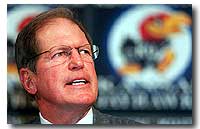
-- Bob Frederick, on the changes on the collegiate sports scene that convinced him to step down as Kansas athletics director.
Bob Frederick, KU's athletics director since 1987, announced he would step down on June 30 after leading the Jayhawks to 27 Big Eight Conference titles, five Big 12 titles and the 1988 national basketball championship.
The pinnacle of his career came in 1992-93, when KU became the first university in Division I history to win a football bowl game and send teams to the men's basketball Final Four and the baseball College World Series in the same year.
A KU graduate known for his commitment to academics and gender equity, Frederick said he had grown weary of what he described as a win-or-else mentality in college sports.
Frederick, 61, faced intensifying public scrutiny in recent years as KU has failed to replicate its Big Eight success in the Big 12. This year, when the football team stumbled to its fifth straight losing season and Frederick discontinued men's tennis and men's swimming and diving to ward off a projected budget deficit, dissatisfaction among fans spilled over into Internet message boards, hostile e-mails to Frederick's office and radio talk shows.
"I'd be dishonest if I didn't say that had some bearing on it, because this has been a tough year," he said. "We had to make some tough decisions."
Chancellor Robert Hemenway said Frederick met with him last weekend to discuss retirement. Hemenway stressed that Frederick was not pressured into making the decision.
"This is not a firing, this is not a buy-out, this is not a request for resignation," Hemenway said. "This is not a leaving, it's not technically even a resignation."
Frederick will continue to serve the university as an instructor in the School of Education, where he currently teaches a class in sports administration through a courtesy faculty appointment.
While serving as KU athletics director longer than anyone except Forrest C. "Phog" Allen, Frederick oversaw 12 major improvement projects totalling $50 million. Memorial Stadium, Allen Fieldhouse and Hoglund Ballpark underwent renovations under his watch, during which KU also built the Wagnon Student-Athlete Center and the Horejsi Family Athletic Center.
KU produced 41 Academic All-Americans over the past 10 years, the sixth most in the nation, and was recognized in 1996 as having the most female athletes in the Big 12.
"I'm very proud of what we've accomplished during the past 14 years, but I'm even prouder of how we did it," Frederick said. "We operated our program honestly, with quality coaches who recruited academically capable student-athletes and with strong support from a competent, caring staff."
Among KU fans, Frederick's greatest accomplishment may have been hiring a virtually unknown North Carolina basketball assistant to succeed coach Larry Brown after the Jayhawks' title-winning season in 1988. The Tar Heel assistant, Roy Williams, went on to lead KU to two Final Four appearances in his first five seasons and become one of the nation's winningest active coaches.
"It's a sad day for me," Williams said. "He's a guy that hired me and has been loyal to me and important to me for 13 years. He's a guy who gave me a chance."
After Williams turned down an offer to return to North Carolina last summer, Frederick drew praise from KU partisans for helping keep Williams in Lawrence. But by halftime of KU's football opener, in which the Jayhawks surrendered an insurmountable 24-0 first-quarter lead at Southern Methodist, fans were firing e-mails and posting demands for his firing on message boards.
| Some numbers that stand out from Bob
Frederick's tenure as KU athletics director:
1 NCAA championships 5 Big 12 championships 27 Big Eight championships 41 Academic All-Americans |
"It's amazing to me how people feel a sense of anonymity with e-mail," he said. "People write and say things to you they'd never say in a letter. It just wore me down. I was just getting worn down. There were a number of times when I'd come home and tell my wife, 'I don't know if I have enough strength to continue to do this.' I always rallied the next day. There was no way you could not feel there were a certain number of people who were not happy with you."
Frederick, a former walk-on on the KU basketball team, was chairman of the Division I Men's Basketball Committee for two years and was a member of a committee that negotiated a $1.725 billion contract with CBS for the men's basketball championships. He was selected as a finalist during the search for the first Big 12 commissioner but lost out to Southwest Conference commissioner Steve Hatchell.
Frederick plans to remain active in KU sports, saying he planned to team with former Kansas State athletics director Max Urick to push for reform in the Big 12's football revenue distribution plan during conference meetings this spring.
But Frederick said he also expected to pare down his schedule and spend more time with his wife, Margey, and the couple's four sons.
"I haven't had a weekend (off) since I graduated from college," he said. "I'm going to be reading the Sunday paper out on my deck, and I'm going to be smiling."